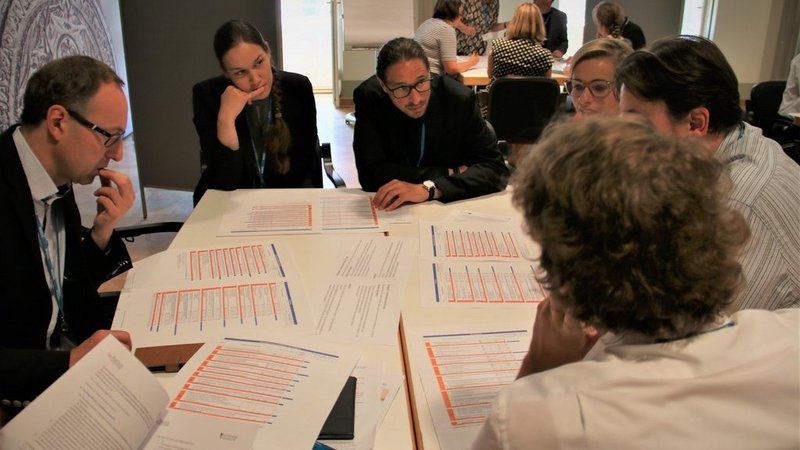"In exchange with others, flexibility in thinking increases - that's why the curriculum development process must be a team process."
Curricula constitute a framework for tertiary higher education and provide information on learning outcomes and the qualification profile of graduates. They must be designed in such a way that the distribution of ECTS credits corresponds to the actual workload and that it is possible to complete academic performance - also at foreign post-secondary educational institutions - without losing study time. Not least because of these requirements, the call for appropriate curricular structures capable of embedding appropriate learning outcomes and qualifications transparently and for all - including underrepresented - student groups is growing louder. In addition to flexible structures for enabling different types of student mobility and exchange, the question of the relevant international and intercultural competences and their representation in the curriculum is playing an increasingly important role. Furthermore, study contents should cover international issues and, if necessary, Eurocentric perspectives should be questioned in the sense of decolonisation.
"The LOUIS Toolbox by Prof. Kouwenaar has been my take-home insight. I will definitely devote more attention to this element in the future. Thank you very much for the interesting day..."
More than 100 representatives from Austrian universities, universities of applied sciences and teacher training colleges took part in one of four workshops between November 2022 and July 2023, which linked these aspects in a practical way. Two experts for the European Higher Education Area, Christina Raab (University of Innsbruck) and Agnes Kriz (FH Technikum Wien), introduced the participants to the relevance and general embedding of learning outcomes, to the state-of-the-art discussion on the internationalisation of curricula and to mobility-promoting structures for curricula. The learning outcomes LOUIS concept received a lot of attention from the internationally renowned expert Kees Kouwenaar from the European Higher Education Alliance AURORA. The LOUIS concept offers a kind of modular system that makes it possible to weave transversal/international competences into curricula. International and intercultural competences accompany an inclusively designed "internationalisation of the curriculum" for all university members and thus also for non-mobile students. EHEA expert Susanne Linhofer (PH Steiermark) provided insights into the relevance of such learning outcomes for teacher training programmes.
"I found the opportunity to ask questions very good. Sufficient time was provided for these. The speakers were great. In particular, Mrs Raab's presentation was the one with the most useful content FOR ME. We have already passed on the LOUIS model presented at our university-wide event. I am very glad that I took part in this workshop, I was able to take a lot away with me."
For the interactive programme points, the host universities (FH Technikum Wien, University of Linz, FH Kärnten, University of Innsbruck) provided their own curricula, on the basis of which the learning outcomes listed, among others, were discussed together. This willingness to have gaps and development potentials of their own curricula pointed out contributed significantly to the success of the workshops. Another success factor was the diversity of the participants, who not only represented different functions and areas of responsibility in higher education - from teaching, to international relations, to curriculum development - but also came from various professions - including engineering, health professions and the arts - and brought their different perspectives to the discussion.
"I have already actively started to repeatedly share content. For example, in the committee for editing curricula; at an event, the LOUIS model was already presented and given to the academic staff as a suggestion.."
Dealing with questions of internationalisation and flexibilisation in the context of the workshop motivated some of the participants to also initiate deeper discussions at their own higher education institutions and to apply for a consulting visit by national EHEA experts. The workshop will be offered in a slightly adapted form for Croatian higher education institutions on 16 November 2023 in Zagreb.
The contents of the workshop accompanied the implementation goals of Goal 1 and Goal 4 of HMIS2030:
-
Promote an all-encompassing culture of internationalisation at higher education institutions
-
Effective skills improvement and institutional learning
This event was co-funded by the Austrian Ministry of Education, Science and Research, as well as by the project „INterconnection/INnovation/INclusion: Austrian contributions to the EHEA 2030 – 3-IN-AT-PLUS“ – a KA3-activity of the European Commission. The European Commission support for the production of this publication does not constitute an endorsement of the contents which reflects the views only of the authors, and the Commission cannot be held responsible for any use which may be made of the information contained therein.



